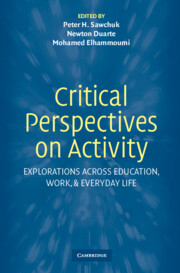Book contents
- Frontmatter
- Contents
- List of Contributors
- Foreword by Seth Chaiklin
- Acknowledgements
- 1 Introduction: Exploring Activity Across Education, Work, and Everyday Life
- SECTION I CRITICAL PERSPECTIVES ON THEORY
- SECTION II EDUCATION
- SECTION III WORK
- 8 Contradictory Class Relations in Work and Learning: Some Resources for Hope
- 9 From Labor Process to Activity Theory
- 10 Values, Rubbish, and Workplace Learning
- SECTION IV EVERYDAY LIFE
- References
- Index
8 - Contradictory Class Relations in Work and Learning: Some Resources for Hope
Published online by Cambridge University Press: 10 December 2009
- Frontmatter
- Contents
- List of Contributors
- Foreword by Seth Chaiklin
- Acknowledgements
- 1 Introduction: Exploring Activity Across Education, Work, and Everyday Life
- SECTION I CRITICAL PERSPECTIVES ON THEORY
- SECTION II EDUCATION
- SECTION III WORK
- 8 Contradictory Class Relations in Work and Learning: Some Resources for Hope
- 9 From Labor Process to Activity Theory
- 10 Values, Rubbish, and Workplace Learning
- SECTION IV EVERYDAY LIFE
- References
- Index
Summary
INTRODUCTION
Antagonism between ruling classes and labouring classes has animated social change in most historical societies. The miserable conditions of the peasantry and other labouring classes in feudal Russia and the terribly coercive rule of the tsars were breeding grounds for the 1917 Russian revolution and “the fantastically stimulating atmosphere of an active, rapidly changing society” (Luria, 1979: 1) in which a cultural–historical activity theory of learning initially developed. The massive concentrations of economic power in corporate capitalist hands in global capitalism today are associated with growing economic polarization, mounting misery in the “third world,” and increasingly coercive efforts by imperial powers, most obviously the U.S. capitalist class and it allies, to strengthen their hegemonic position and attack the condition of their own labouring classes at the same time as they undermine allegiance of many of these workers to these regimes. Class antagonisms can hardly explain all social change but neither can they be ignored if we hope to understand the dynamic processes of lived experience, working, and learning in advanced capitalism (see Seccombe and Livingstone, 1999).
Marxist theories of learning were first systematically developed by Vygotsky and his followers in the wake of the Russian revolution, stagnated under Stalinism, and have subsequently been further developed in both the East and West as variants of cultural–historical activity theory (CHAT). However, class relations in the learning process have remained largely underdeveloped in this research.
- Type
- Chapter
- Information
- Critical Perspectives on ActivityExplorations Across Education, Work, and Everyday Life, pp. 145 - 159Publisher: Cambridge University PressPrint publication year: 2006
- 3
- Cited by

